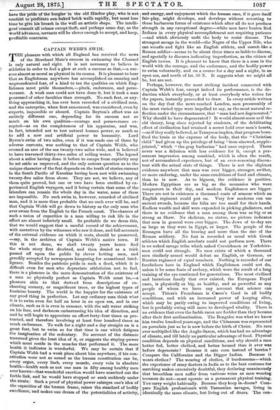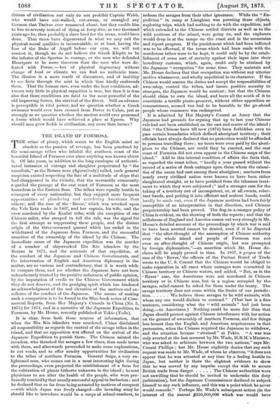CAPTAIN WEBB'S SWIM.
THE pleasure with which all England has received the news of the Merchant Mate's success in swimming the Channel is only natural and right. It is not necessary to believe in athletics in order to feel a glow at such a success as that,—a suc- cess almostas moral as physical in its causes. It is pleasant to hear that an Englishman anywhere has accomplished an amazing and unprecedented feat, of a kind to tax the qualities on which Eng- lishmen most pride themselves,'—pluck, endurance, and perse- verance. A weak man could not have done it, but it took a man possessed of other faculties than strength. No such feat, or any- thing approaching it, has ever been recorded of a civilised man, and the enterprise, when first announced, was considered, even by experts, impossible or absurd. Captain Boyton's effort was an -entirely different one, depending for its success not so much on his own qualities—courage and perseverance ex- cepted—as on the completeness of his apparatus, and was, in fact, intended not to test natural human power, so much as -to add a new and artificial power to humanity. Lord Byron's swim of two miles, even if it was made one of three by adverse currents, was nothing to that of Captain Webb, who crossed an arm of the sea twenty-two miles wide, and is believed to have traversed thirty-two miles of rolling water. The legend about a sailor having done it before to escape from captivity may be set' aside as unproved, and the only serious question as to the unique character of the feat depends on the truth ef stories current in the South Pacific of Kanakas having been met with swimming twenty-five miles from shore. They are not, we believe, any of -them quite proved, but one or two have been credited by ex- perienced English voyagers, and it being certain that some of the islanders can remain the whole day in the water, none of them are impossible. No such swim is, however, recorded of civilised man, and it is more than probable that no such ever will be, and that Captain Webb will go down to history as the only man who ever swam from the English to the French coast. The chances of such a union of capacities in a man willing to risk life in the effort are almost infinitely small. So probable do we deem this, that we would suggest that a careful record of the achievement, with narratives by'the witnesses who saw it done, and full accounts of the external evidence on which it rests, should be preserved, —say, in the archives of Captain Webb's native town. If this is not done, we shall twenty years hence find the whole story first doubted, and then denied as a trick passed off upon the public by clever betting men, and greedily accepted by newspapers hungering for sensational intel- ligence. Besides the patriotic pride in such a deed, which it is difficult even for met' who depreciate athleticism not to feel, there is a pleasure in the mere demonstration of the existence of a man so physically perfect as Captain Webb must be,—a pleasure akin to that derived from descriptions of en- chanting scenery, or magnificent trees, or the highest types of feminine beauty. The world is the happier for the existence of any good thing in perfection. Let any ordinary man think what it is to swim even for half an hour in an open sea, and in our climate, such as'it is even in summer, with the salt water striking on his face, and darkness embarrassing his idea of direction, and and he will begin to appreciate an effort forty-four times as pro- tracted, and therefore involving at least four hundred times as much endurance. To walk for a night and a day straight on is a great feat, but to swim so for that time is one which fatigues the imagination of the sedentary. No account of the distance traversed gives the least idea of it, or suggests the staying-power which must reside in the muscles that performed it. The mere health it indicates is wonderful. We may be certain that if Captain Webb had a weak place about him anywhere, if his con- atitution were not as sound as the human constitution can be, eVery organ, every limb, every muscle, every vein in absolute health—health such as not one man in fifty among healthy men ever knows—that wonderful exertion would have searched out the -feeble link, and he would have stopped or sunk suddenly under the strain. Such a proof of physical power enlarges one's idea of the capacities of the human frame, raises the standard of bodily excellence, and makes one dream of the potentialities of activity, and and-enioyment which the human race, if it gave itself
fair-play, might develope, and develops without reverting to those barbarous forms of existence which after all do not produce strength in any exceptional degree—white men have beaten Red Indians in every physical accomplishment not requiring patience —and which obviously unfit the body to resist disease. The strongest savage in the world—the Negro of the Upper Nile, who can wrestle and fight like an English athlete, and march like a Roman soldier—seems to be about three times as liable to disease, and specially to diseases indicating imperfection, as the citizen of English towns. It is pleasant to know that there is a man in the world with the courage, and the endurance, and the bodily power to swim voluntarily, and on a course for a day and a night, in an open sea, and north of lat. 50 N. It suggests what we might all be, but are not.
Perhaps, however, the most striking incident connected with Captain Webb's feat, except indeed its performance, is the de- duction which everybody, or at least everybody who writes for the papers, instantly proceeded to draw. In every article written on the day that the news reached London, men presumably of the most varied type were impelled to say, as the most natural re- flection under the circumstances, that "man had not degenerated." Why should he have degenerated ? It would almost seem as if the old theory, long since rejected by students, of the debilitating effect of civilisation had retained a secret hold over men's hearts, —as if they really believed, as Tennyson implies, that progress bener fited the brain at the expense of the body, that the "Christian child" had given up the privilege of being "iron-sinewed, supple- jointed," which " the gray barbarian" had once enjoyed. There never was a delusion with less evidence for it, except a per- manent impression among mankind, which is often the result, not of accumulated experience, but of an ever-renewing discon- tent with the actual state of things. There is not the slightest evidence anywhere that man was ever bigger, stronger, swifter, or more enduring, under the same conditions of food and climate, than he is now. As to bigness, the evidence is positive. Modern Egyptians are as big as the mummies who were conquerors in their day, and modern Englishmen are bigger. There are not in existence a thousand coats of armour which an English regiment could put on. Very few moderns can use ancient swords, because the hilts are too small for their hands. Endless wealth and skill were expended in picking gladiators, and there is no evidence that a man among them was as big or as strong as Shaw. No skeleton, no statue, no picture indicates that men in general were ever bigger. The Jews of to-day are as large as they were in Egypt, or larger. The people of the Romagna have all the bearing and more than the size of the Roman soldiery. No feat is recorded as usual with Greek athletes which English acrobats could not perform now. There is no naked savage tribe which naked Cornishmen or Yorkshire- men could not strangle. No race exists of which a thousand men similarly armed would defeat an English, or German, or Russian regiment of equal numbers. Nothing is recorded of our forefathers here in England which Englishmen could not do, unless it be some feats of archery, which were the result of a long training of the eye continued for generations. The most civilised and luxurious family that ever existed, the European Royal caste, is physically as big, as healthy, and as powerful as any people of whom we have any account that science can accept. Thiers's Frenchman is Caesar's Gaul in all bodily conditions, and with an increased power of keeping alive, which may be partly owing to improved conditions of living, but is probably owing still more to developed vitality. There is no evidence that even the feeble races are feebler than they became after their first acclimatisation. The Bengalee was what we know him twelve hundred years ago, and the Chinaman was represented on porcelain just as he is now before the birth of Christ. No race ever multiplied like the Anglo-Saxon, which has had no advantage of climate, and till lately no particular advantage of food. Physical condition depends on physical conditions, and why should a race better fed, better clothed, and better housed than it ever was before degenerate? Because it eats corn instead of berries ? Compare the Californian and the Digger Indian. Because it wears clothes? The wearing of clothes, if burdensome—which the experience of army doctors in India as to the best costume for marching makes excessively doubtful, they declaring unanimously that breechless men suffer from varicose veins as men wearing trousers do not—must operate as a permanent physical training. Yon tarry weight habitually. Because they keep in-doors? Com- pare English professionals with Tasmanian savages, living in identically the same climate, but living out of doors. The con-
ditions of civilisation not only do not prohibit Captain Webb, who would have out-walked, out-swum, or strangled any German that Tacitus ever romanced about, but they enable him to live to seventy instead of dying at forty-five, as two thousand years ago he, then probably a slave bred for the arena, would have done. That races have degenerated in what we may call the physical-moral qualities is incontestable, or at least, having the fear of the Duke of Argyll before our eyes, we will not contest it, though we do not believe the Greek Klepht to be the inferior of the Spartan in courage, or the men who defended Bhurtpore to be more timorous than the men who were de- feated with Porus, —but of physical degeneracy without change of food or climate we can find no authentic trace. The illusion is a mere result of discontent, and of inability to see facts through the mist in which time kindly enshrouds them. That the human race, even under the best conditions, ad- vances very little in physical capacities is true, but then it is true also that those conditions are fatal to the most powerful of the old improving forces, the survival of the fittest. Still an advance is perceptible in vital power, and we question whether a Greek swimmer would ever have crossed from Dover to Calais, just as strongly as we question whether the ancient world ever possessed a horse which would have achieved a place at Epsom. Why should men grow feeble in civilisation, any more than horses ?































 Previous page
Previous page